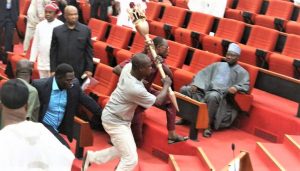
The Guardian interrogates the recent invasion of the Senate by hoodlums to cart away the mace in this editorial published on May 3, 2018. ..Read on
————————————————————————————————————————————
The invasion by hoodlums of the Senate chambers and the unlawful removal of the mace, while the house was in session, was a serious affront on the upper house, the whole legislative arm of government, and, in the widest implication, a threat to the entire democratic structure, process and purpose. It is a condemnable act. It is unacceptable. But beyond mere condemnation, the three-arm constituted government of the Federal Republic of Nigeria must identify the perpetrators of this outrageous act, detect their motive(s) and after due process, visit on the culprits the severest punishment allowed in law. For never again must this happen. This country must be made safe for democracy.
There are indeed good reasons to view this act with the utmost seriousness. Firstly, the legislature is one of three institutions of a democratic system of government. To render it unsafe and unable – even for a moment – to function cannot but destabilize that institution in particular and the system in general. Secondly, in a nation governed by the rule of law, the legislature is the sole institution granted powers to make those laws. The extant constitution says that ‘the National Assembly shall have power to make laws for the peace, order, and good government of the Federation or any part thereof…’ If the legislative arm of government is, in any way conceivable, intimidated, or rendered unsafe to perform its function, it is a direct threat to the rule of law, a toleration of lawlessness, an invitation to anarchy. This must not be; Nigeria has, at this time, enough acts of lawlessness to deal with.
The forcible removal of the mace from the house in session is an attack on the democratic process. The mace, it needs to be said, is the symbol of the authority of the House to do just what the constitution charges and empowers it to do as provided in the relevant sections of the Constitution. In the American democracy from where Nigeria has borrowed its present system of government, the presence of the mace, how and where it is positioned in the chamber signify various meanings. The point here is that symbolically, a house session without the mace lacks authority and by implication decisions taken are invalid. The theft of the mace from the house is a willful act to disempower the house and render it ineffective. That constitutes an attack upon the stability of the polity.
The ease with which hoodlums enter the grounds of the National assembly, the Senate chambers, and take away the mace indicate clearly that the security system is either terribly weak, or that it was compromised. Can this happen to the Congress of the United States, or the Parliament of the United Kingdom? As a possibility yes, but as a probability, no. Even as the urgent need to comprehensively review the security architecture of the National Assembly (NA) is already being discussed by the House leadership with the security agencies, the time has come to widen the perspective beyond the immediate insecurity of the National Assembly, to include clear and present nationwide insecurity.
The time has come to decentralise the policing structure of Nigeria. The U.S. Congress is covered by the United States Capitol Police (USCP), a multi-unit structure that is answerable to the legislative branch of the U.S. government through the Capitol Police Board. The USCP units include containment and emergency response team, dignitary protection, threat assessment, intelligence gathering and analysis, and bomb squad. With a structure like this, can the Congress suffer what the Nigerian Senate went through recently? Possibly yes, but most probably no. Having copied so many aspects of the American system of democratic governance, it makes sense that Nigeria should adopt this protection method too.
The policing system in Nigeria is archaic and most unsuitable to the challenges of modern times. For the umpteenth time, we should say, along with most voices of wisdom on this matter, that policing in this country must be localised if it is to be effective. To effectively and efficiently keep law and order in the polity, state and community (local government, university etc.) police must be created.
Not only is the National Assembly at risk from hoodlums and other criminals, it is no exaggeration that in these times, nowhere and no one is safe in this country and the blame for this, ironically, falls substantially –but not completely- upon the legislature. It has failed in its constitutionally assigned duty to ‘make laws for the peace, order, and good government’ of this republic. The legislature has been too self-seeking, and derailed from its constitutional focus. It has been too devoted to serving narrow, parochial interests to pursue the highest good of the greatest number of the electorate. We seek exceptional acts of patriotism in the legislature but they are hard put to find it. If as they say, chicken eventually come home to roost, the invasion of the hallowed chambers of the Senate is only a new dimension to the widening insecurity in the land. Hapless citizens are killed each day across the country and government response is mere statements of regret. Perhaps because the electorate does not identify with the travail of the legislators, it is no wonder then that there is no spontaneous public protest against the invasion of the Senate.
The primary purpose – and the constitutional duty – of this democratically elected government is to ensure the security and welfare of the people. To make Nigeria safe for democracy and democracy safe in Nigeria, the three arms of government must do their respective and collective duties.






